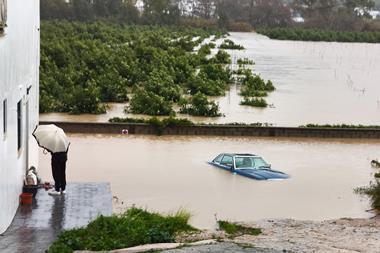Clinging to hope
MAFF reacted rapidly to foot and mouth disease. The week ended with suppliers fearing the worst but hoping for the best. Clive Beddall, John Wood and Mike Ingham report
The next seven days will see Britain's farming industry hoping and praying that foot and mouth disease will be contained and the crisis will be over.
On Thursday evening, as an already battered farming industry held its breath, NFU president Ben Gill emerged from crisis talks with agriculture minister Nick Brown to tell waiting media: "We expect the worst, but hope for the best."
A prolonged foot and mouth crisis will have devastating effects on Britain's dairy industry with many milk producers quitting the sector, one of the UK's largest exporters predicted as The Grocer went to press on Thursday afternoon.
And the Food and Drink Federation said the ban on UK dairy and meat exports could lose its members £50m before the embargo is reviewed on March 1.
As the government slapped an immediate bar on the export of most dairy products, Tony Vernon, chairman of Murray Vernon, the Cheshire based international group, told The Grocer: "Massive quantities of cream and skimmed milk concentrate are exported from the UK. If exports are banned, that product must be turned into butter and other items, putting pressure on our processing plants. If that continued the market would collapse as there would be nowhere for all the extra product to go."
Vernon, a trader in the Cheshire dairying region during the devastating foot and mouth outbreak more than 30 years ago, added: "This has brought back dramatic memories of the animal bonfires on every dairy farm across our county in 1967. If the disaster were to be repeated, many dairy farmers could decide to take their cheque from the government and pull out of milk production. That would be a massive blow to the home industry."
The UK milk industry has a herd of 1.5 million cows and up to 100,000 dairy farmers. It exports more than 400,000 tonnes of products a year.
As Vernon spoke, exporters were assessing what happens to shipments of dairy products currently in transit to oversas markets. It was assumed that product for which health certificates had already been granted would be able to proceed, but there were fears on Thursday that some countries would turn back shipments from the UK as soon as vessels arrived.
Provision Trade Federation director general Clare Cheney was meeting MAFF and EU officials.
Cheney, who described the outbreak as "an absolute disaster in every respect", was hopeful that products which had been produced before February 1 could be shipped. There is some relief for food processors in that MAFF excludes items processed in line with guidelines on heat treatment and acidity.
However, as the dairymen assessed the effects on their sector, the meat industry was calculating the cost to its export trade of the ban on exports of fresh meat produced after February 1. But the impression of an industry heavily dependent upon exporting is misleading.
The UK is a net importer of meat on a very large scale. Total imports this year were predicted to exceed 1.2 million tonnes, against exports of well under 500,000 tonnes, according to MLC forecasts published before the latest crisis.
Exports account for about 11% of total production, but imports meet roughly 28% of consumption requirement. Pork and sheepmeat are the sectors most exposed to disruption by the export ban. Foreign buyers, especially the Germans, take more than 20% of pork production, while the French are the main customers for the 30% of mutton and lamb exported.
Traders expect the most serious damage to occur in the pork sector. Of the 200,000 tonnes forecast to move out of the UK this year, a large proportion would be sow meat for food product manufacturers on the continent.
Locked into the domestic market, it would be of little or no use to retailers and could put severe pressure on wholesale prices for manufacturing meats.
Meanwhile, suspicion the outbreak was caused by illegally imported pigmeat, has led to farmers and meat producers urging the government to step up border controls.
A MAFF spokesman said the strain of FMD was Pan Asiatic which was seen in Japan, Korea, parts of the Middle East and South Africa. She added: "We are confident the disease entered the UK illegally, in a product."
{{NEWS }}
Close menu
- Home
- Retail & Wholesale
-
Products & Suppliers
- Back to parent navigation item
- Products & Suppliers
-
Product Categories:
- Back to parent navigation item
- Product Categories:
- Alcoholic drinks
- Bakery
- Cereals & breakfast
- Cheese
- Chicken & poultry
- Chocolate
- Confectionery
- Crisps, nuts & snacks
- Dairy
- Fish
- Fresh produce
- Frozen
- Household
- Meat
- Own Label
- Sauces & condiments
- Seasonal
- Soft drinks
- Vaping
- Vegan & plant-based
- World foods
- Suppliers
- People
- Reports & Data
-
Topics A-Z
- Back to parent navigation item
- Topics A-Z
-
Popular topics:
- Back to parent navigation item
- Popular topics:
- Cost of living crisis
- Crime
- Deposit Return Schemes
- Finance
- Government & Regulation
- Health
- Inflation
- Loyalty
- Marketing
- Mergers & Acquisitions
- New Product Development
- Sourcing
- Supply chain
- Sustainability & environment
- Technology
- Ultra Processed Foods
- Vaping
- A-Z all topics
- Content by type:
- Events
- Ask iA (beta)
- Subscribe now
Sign in to comment on this article
Not logged in before? Register for FREE guest access today.
You will be able to:
- Read more stories
- Receive daily newsletters
- Comment on stories
Advert














No comments yet